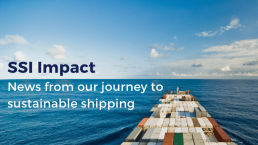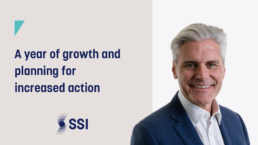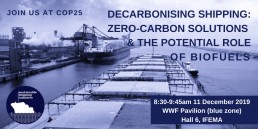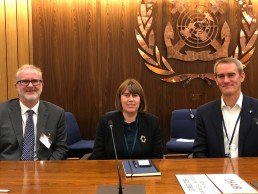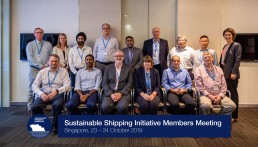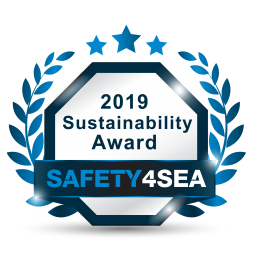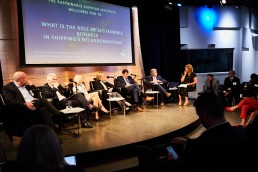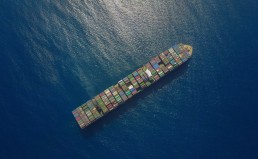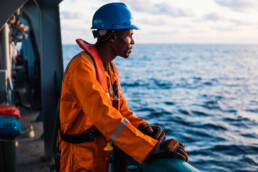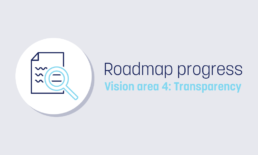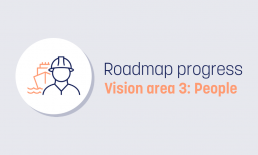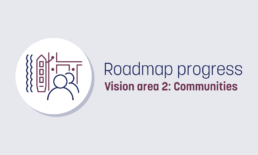SSI Impact: News from our journey to sustainable shipping - 04/2022
The SSI Newsletter is published quarterly and is the place to find news from the SSI community, our partners and the impact of our collective work along our journey to a sustainable shipping industry.
Subscribe to SSI Impact: News from our journey to sustainable shipping
A year of growth and planning for increased action towards a sustainable shipping industry
15 December 2022 – 2022 has brought with it renewed connectivity and a return to normality for most of us, with conferences and in-person meetings returning to the agenda. However, it was also a stark reminder that we cannot continue behaving in our current and historic unsustainable ways. Change is crucial if we are to adapt to the needs of a sustainable future. SSI’s mission to be a catalyst for a sustainable and successful shipping industry remains as pertinent as ever, and we continue on this crucial journey. Within the SSI, this year has granted our members and secretariat greater opportunities for in-person dialogue and collaboration, to discuss and brainstorm ideas for furthering our existing work, as well as to identify new focus areas where we can create impact. With this in mind, 2022 was a year of planning and growth for the SSI. We have had the pleasure of growing our secretariat, with two new employees, along with two new members, the Institute for Human Rights and Business (IHRB) and, our first port member, the Vancouver Fraser Port Authority.
Behind the scenes, we have been working on an updated strategy. Through an in-person workshop in March this year, members got to make their mark on the strategy, ensuring that it leads to a stronger SSI that can catalyse demonstrable progress within the industry, with the support and active engagement of our member and partner network. Part of this change includes expanding our membership offering to ensure greater opportunities for those in the maritime ecosystem to get involved. New members and partners will allow for a broader range of perspectives as we identify ways to tackle the sustainability challenges of the maritime sector together.
At the same time, we understand that shipping’s operations are intertwined within a wider system. No company or industry can singlehandedly solve the systemic challenges that propel inequality and the climate, biodiversity, and pollution crises. In 2023, we are excited to continue working with various stakeholders within and outside of the maritime sector, ensuring that we are hearing from new voices and learning from unique perspectives and experiences, so that we are in a position to support each other through this sustainability transformation.
Our current working groups engage with sustainability holistically and aim to tackle some of the systemic issues that the sector needs to address in order to forge a better path forward for both people and the planet. Looking ahead to the coming year, we will continue shining a light on emerging issues that require action.
This year saw SSI build on last year’s Exploring shipping’s transition to a circular industry report through the Ship lifecycle working group. Collaborating with members, academic institutions, and organisations across the shipping and steel sectors, we are exploring the topic of sustainable steel, lower-carbon steel shipbuilding, and the drivers and barriers to closing the loop on steel within the shipping value chain. The coming months will see the presentation of this research to the industry and an outreach campaign to encourage industry uptake and further discussions around this important topic.
As shipping embarks on its sustainability transition, we have the opportunity to build resilient, sustainable supply chains. We have continued to work on advocacy for the Sustainability criteria for marine fuels work, which aims to ensure that sustainability is considered at the same level as availability, cost, and technical feasibility in discussions about future fuels. Through SSI’s member WWF, we are engaged in an IMO correspondence group tasked with the development of fuel lifecycle guidelines. In addition to this, we have promoted the criteria at various events, and have focused on collaboration – partnering with the Mærsk Mc-Kinney Møller Center for Zero Carbon Shipping with the objective of sharing knowledge and best practice on shipping’s sustainable decarbonisation. 2023 will see us continue to build up dialogue and partnerships on this topic, as well as test the application of the criteria in the context of green corridors.
At the same time, we must continue to shine a light on those impacted by the changes to the industry. In October SSI and IHRB released the first Delivering on seafarers’ rights progress report, reflecting on progress since the launch of the Code of Conduct and self-assessment questionnaire. The SEAFAIRER Roundtable convened seafarers, shipowners and others to share their experiences, learnings, and best practices on topics such as shore leave, gender, diversity, and discrimination. In the coming year, we will continue tracking progress whilst convening inclusive environments for experts and seafarers to share their experiences and best practices on key issues. Accompanying this, we are continuing to engage with cargo owners, shipowners, managers, and charters to encourage uptake of the Code of Conduct and increase transparency on progress and results to better champion seafarers’ rights to a safe, healthy, and secure environment.
Finally, we are working to ensure that the Roadmap to a sustainable shipping industry acts as a living tool for the sector, tracking industry progress in a way that stimulates action towards sustainability. We will commence updating each vision area to ensure that the roadmap reflects global challenges and trends across the maritime ecosystem. Going forward, the Roadmap will act as a compass for the maritime sector, allowing better navigation of sustainability challenges, transitions, and emerging issues, whilst simultaneously shining a light on positive changes within the sustainability journey.
I am very proud to see the progress that SSI has made – the new relationships, valuable insights, and fresh perspectives originating from the SSI community, from the secretariat to the members, trustees, and all external partners and stakeholders that have made presentations and otherwise engaged with our work.
Shipping has a crucial role to play in establishing a resilient supply chain both within shipping and when servicing other industries. I am confident that the research SSI has shared, and will continue to share, will catalyse further transformation as shipping embarks on its just and green transition. The time to act is now – we must not let the perfect become the enemy of what is good and needed. Let us navigate the course to sustainable shipping, together.
Wishing all a good holiday season and a happy new year,

Guy Campbell
Chair
Sustainable Shipping Initiative
SSI is signatory to “No Paris Without Montreal" declaration
In December, Parties to the UN Convention on Biological Diversity (CBD) met COP15 to determine the post-2020 Global Biodiversity Framework (GBF). The GBF is a roadmap to guide action to halt biodiversity loss by 2030 and achieve recovery by 2050.
The ocean is the largest living space on Earth and our best ally to tackle climate change and biodiversity loss. We need to step up action and ambition for the effective protection of marine life. As daily users of our oceans, it is vital for shipping to be part of the solution, not the problem.
This is a key moment for maintaining and restoring ocean biodiversity, enabling the oceans upon which we rely to continue providing vital ecosystem services to nature and people worldwide.
SSI is proud to be one of the 86 organisations, alongside SSI members Maersk and WWF and under the coordination of the Ocean & Climate Platform, calling for action through the “No Paris Without Montreal” declaration. The declaration is built around 12 key recommendations, and it calls on Parties to the CBD to establish an ambitious policy framework that supports the Paris Agreement and enables the UN 2030 Agenda for Sustainable Development.
COP15 resulted in the adoption of a target to protect at least 30% of the world’s terrestrial and inland water, as well as 30% of coastal and marine areas by 2030.
Ram Ganesh Kamatham
Ram Ganesh Kamatham
Project Manager
Ram Ganesh joined the Sustainable Shipping Initiative Secretariat in November 2022 where he is responsible for SSI’s roadmap to a sustainable shipping industry.
He started his career at IBM in India as an instructional designer, before moving into consulting across the private sector, the policy-think tank space and IGOs, including a stint at UNESCO. He brings his background in learning design, ethnographic research and strategic foresight towards engaging the cross-cutting and emergent issues that impact the maritime sector’s transition to sustainability.
Ram Ganesh is from Bangalore, India and has lived in the Caribbean and in Singapore. He was a Felix Scholar at SOAS, University of London and holds an MA in the Anthropology of Media. He was also a Lee Foundation Scholar at RSIS, NTU Singapore where he earned an MSc in International Relations. He has additional qualifications in psychology and strategic studies, and attended the School of Modern Diplomacy co-organised by the Diplomatic Academy of Vienna and the United Nations University.
SEAFAIRER Roundtable in Singapore
11 October 2022 – To mark the first anniversary of the Delivering on Seafarers’ Rights Code of Conduct, the Institute for Human Rights and Business, the Sustainable Shipping Initiative, the Rafto Foundation and the Mission to Seafarers held an inaugural in-person “SEAFAIRER” roundtable in Singapore in October 2022, hosted by Swire Shipping with support from the Lloyd’s Register Foundation and the Swiss Federal Department of Foreign Affairs.
This event brought seafarers and seafarers’ welfare/rights organisations together with charterers, shipowners, ship managers & operators, cargo owners, unions, government and others to hear the seafarers’ perspective on welfare issues, and to hear the industry perspective on hurdles to and benefits of implementing the Code of Conduct. Many thanks to all the speakers and participants for their input.
Read the event summary on IHRB’s website.
EU parliament adopts new sustainability reporting rules for corporations
Progress against milestone 4.2030.5:
Sustainability performance data is audited, validated and made publicly available.
All large corporations in the European Union will need to disclose data on the impact of their activities on people, the planet, and any sustainability risks that they are exposed to.
The Corporate Sustainability Reporting Directive (CSRD) addresses shortcomings in the existing legislations. The data submitted is subject to independent auditing and certification.
Source: European Parliament.
Norwegian government extends countries' wages and conditions to countries' waters
Progress against milestone 3.2020.5:
Workers across all phases of ship lifecycle, onboard and offshore, have access to union representation and their working and living standards are improved.
The Norwegian government has pledged to ensure that Norwegian wages and working conditions apply in Norwegian waters.
Source: Nautilus.
Safety4Sea launches SEAFiT service
Progress against milestone 3.2040.5:
Onboard shipping careers rank equally with shore-based industries in terms of attractiveness and job satisfaction, career development, and impact on mental health and well-being.
Safety4Sea’s new service aims to ensure that mental health and wellbeing become a global priority for all maritime stakeholders.
The service includes a comprehensive guide for shipping organisation to evaluate the mental health of their shore and sea staff, raise mental health awareness across the organisation, and ensure that mental health policies are in place and that corporate culture is aligned with wellbeing needs.
Source: Safety4Sea.
Piracy attacks at lowest recorded levels
Progress against milestone 2.2030.3:
Corruption and piracy are eliminated through collaboration with communities.
The ICC International Maritime Bureau (IMB) has recorded the lowest volume of global piracy and robbery incident in the last 3 decades.
The last quarterly report indicated 90 incidents of piracy and armed robbery in the first 9 months of 2020. Unfortunately, violence towards the crew continues.
Source: ICC.
Maritime Just Transitions Task Force publishes 10-point action plan
Progress against milestone 3.2040.5:
Onboard shipping careers rank equally with shore-based industries in terms of attractiveness and job satisfaction, career development, and impact on mental health and well-being.
The Maritime Just Transition Task Force was announced at COP26 by the International Chamber of Shipping (ICS), the International Transport Workers’ Federation (ITF), the United Nations Global Compact, the International Labour Organization (ILO) and the International Maritime Organization (IMO).
The Task Force will lead and coordinate efforts to work with governments, industry, workers and their representatives to ensure a safe and human-centred approach to achieving green shipping, stressing the principles set out in the ILO Guidelines for a Just Transition.
At COP27, they released a position paper outlining a 10 point action plan to achieve a Just Transition for seafarers.
Note: SSI is a member of the task force’s Global Industry Peer Learning Group.
Source: ITF; UN Global Compact.

